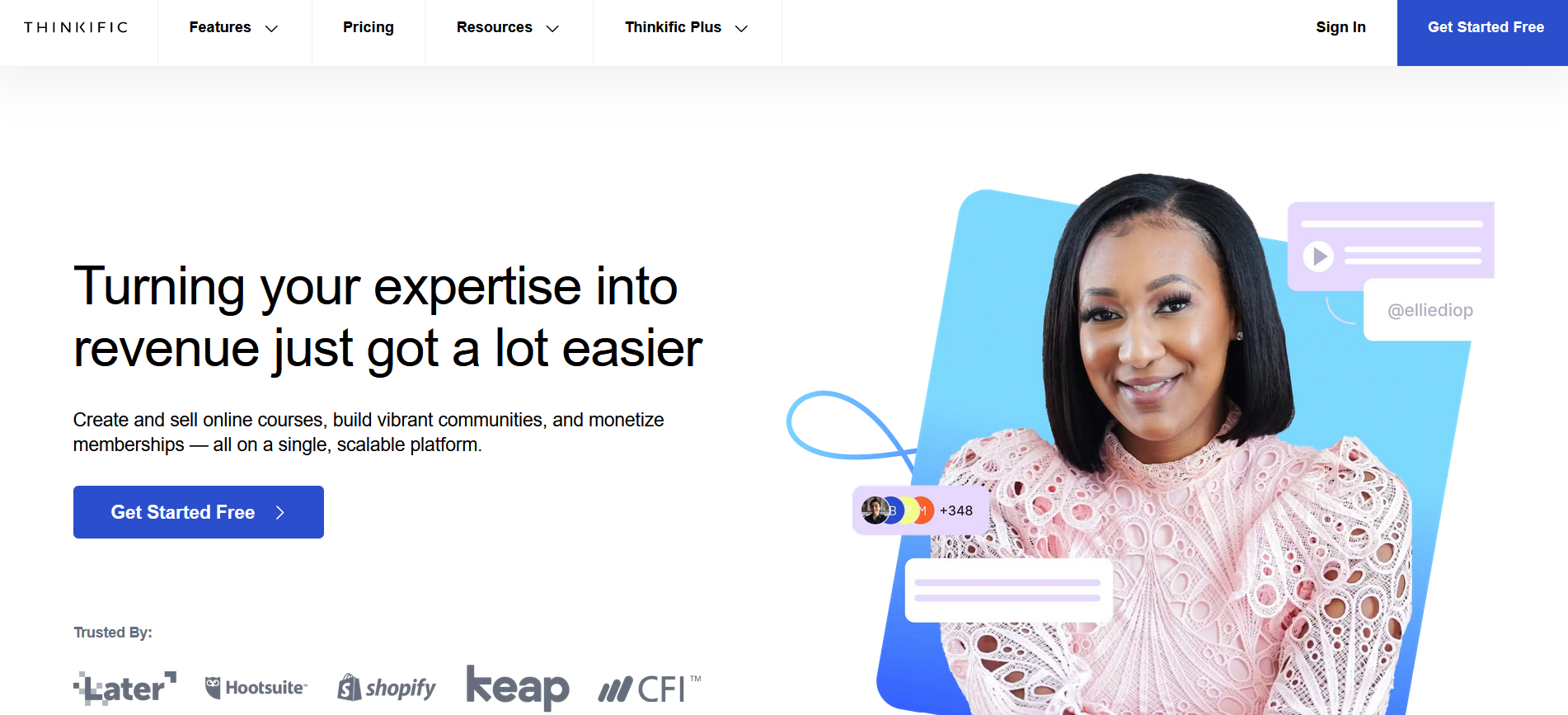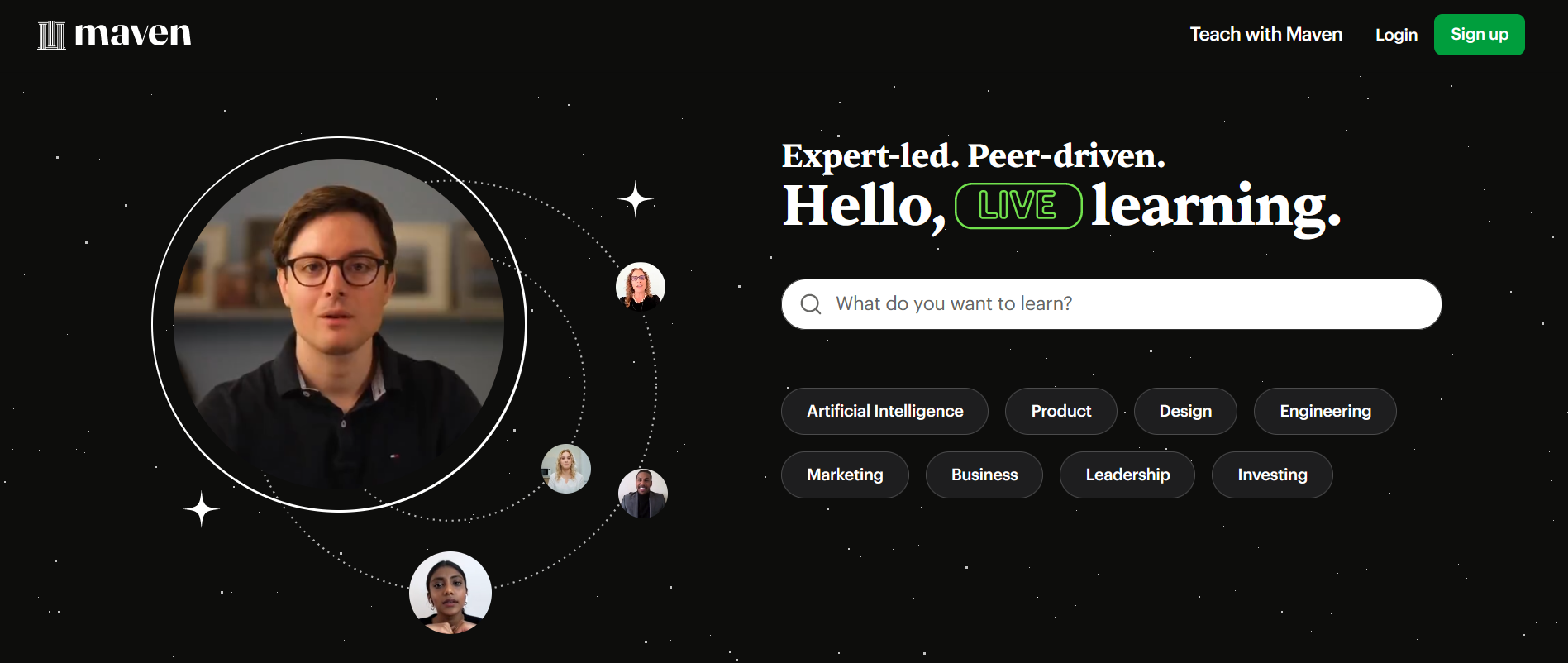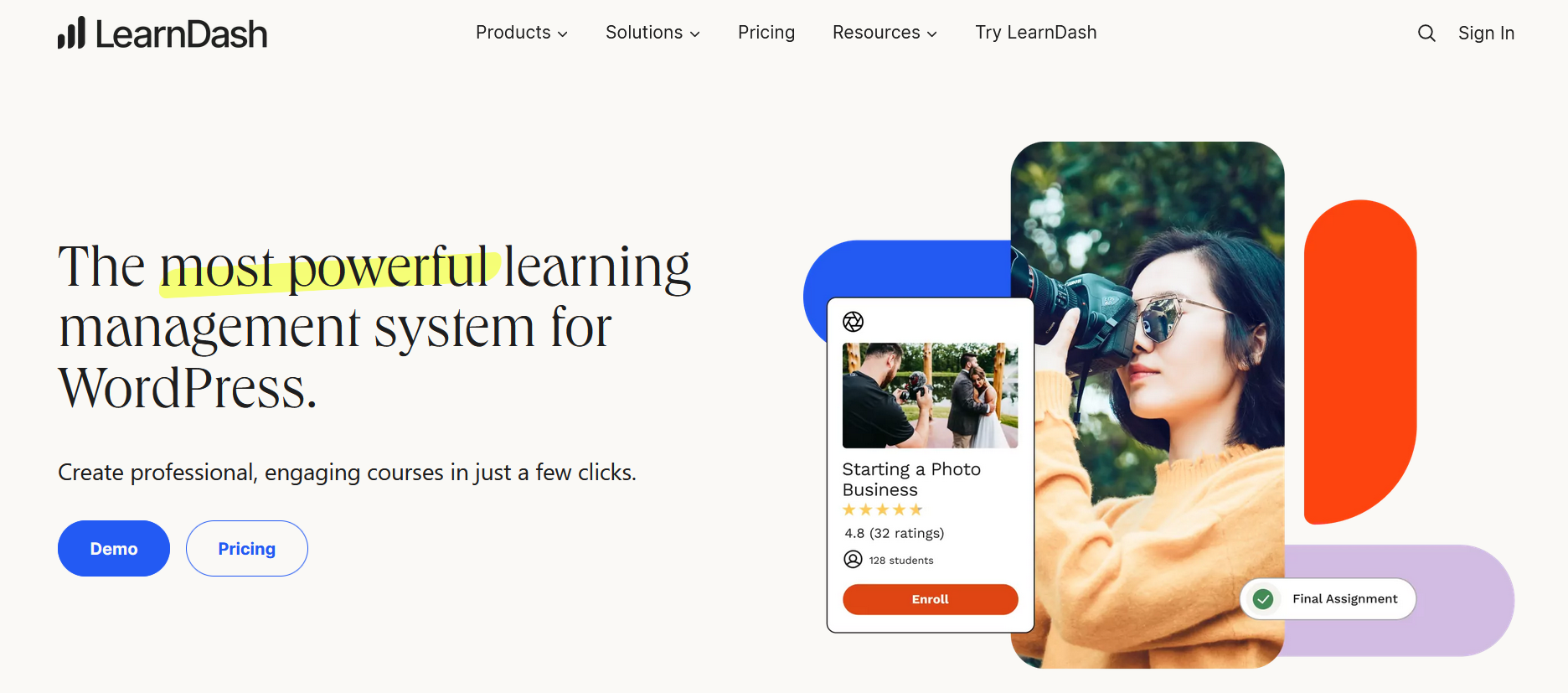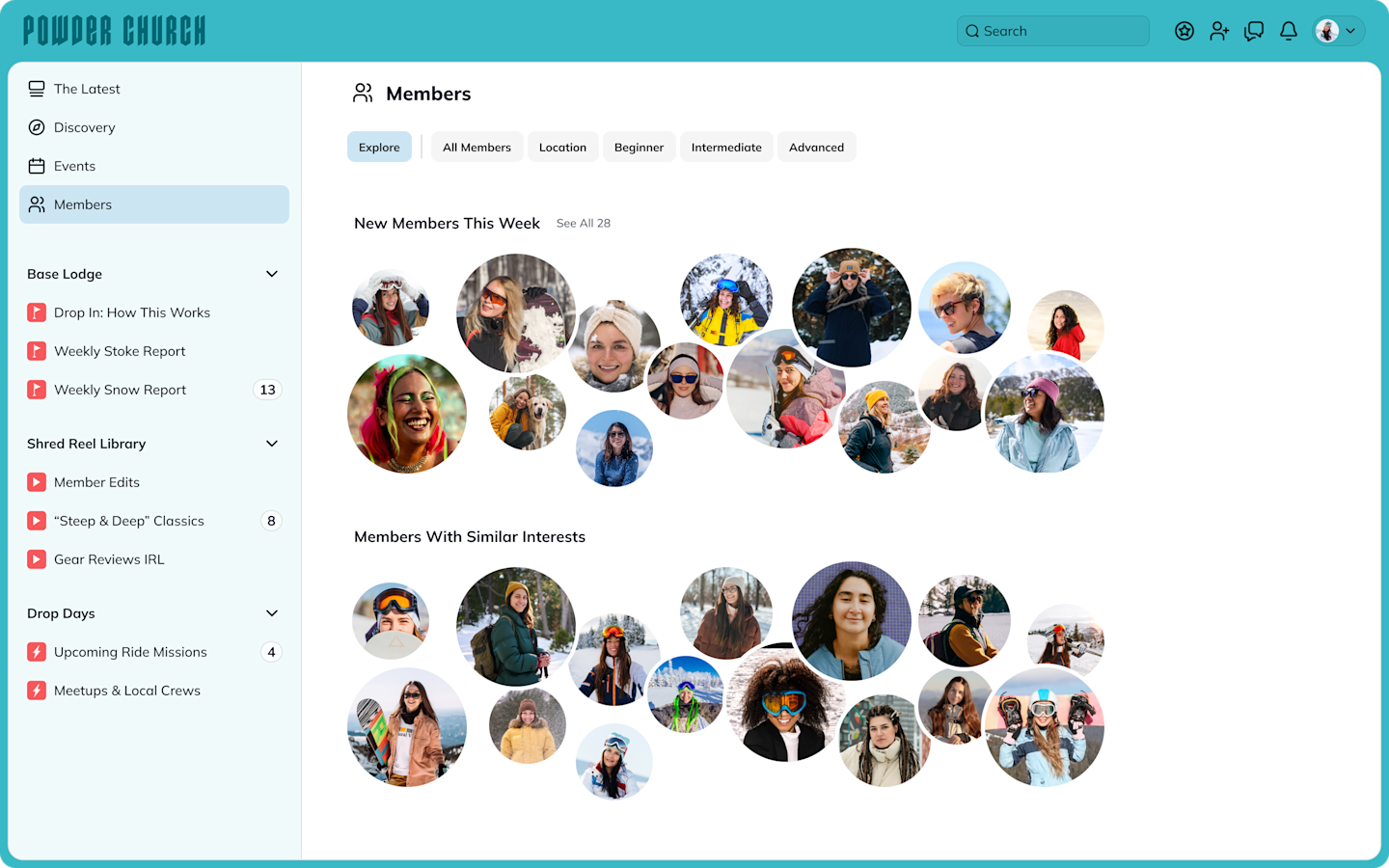Online Courses
Where to Sell Online Courses - 11 Best Platforms for 2026
Ready to create your online course business that THRIVES? We’ll introduce you to the best platforms to sell courses online.
Author
Mighty Team
Last Updated
December 11, 2025

The online course business is booming. Online learning is projected to reach $279 BN by 2029.
And sure there's competition. But there’s also more appetite for online courses than ever. We’re getting used to online learning, in some cases with online courses even replacing traditional colleges or universities – as is the case with Google’s new, free courses.
So if you’re ready to create an online course, you’ve probably hit the question all course creators come up against:
“Where can I sell online courses?”
In this article, we’re going to walk you through the best platforms to sell courses online.
We’ll tell you what to look for in a course selling platform, and give you an idea for how to choose.
Where To Sell Online Courses (Quick Chart)
Here's a quick summary of some of the best options for selling online courses. You can jump to the full entry for each option by clicking the link.
Best Features | Use For | Starting From | |
|---|---|---|---|
#1-Ranked (G2) Community Management Software, Live & Async Courses, Built-in Events + Livestreams | Courses, Memberships, Livestreams, & Events | $109/mo | |
Premium Branded Apps, Proactive Submissions, Design & Strategy Support, VIP Care (e.g. Pre-Launch Meetings, Complete Set-up Monthly Reviews) | Live & Async Courses on Branded Apps (+ Communities, Events, & Livestreaming) | Learn More Here | |
Asynchronous Courses, Marketing Funnels, & Integrated Email | Pre-Recorded Courses & Basic Discussions | $149/mo | |
Online Courses, Digital Products, & WordPress Integration | Online Courses & Digital Products | $49/mo | |
Pre-Recorded Courses, AI Evaluations, Affiliate Program | Async Courses | $59/mo + 5% Fees | |
Course Marketplace | Built-in Audience for Courses | Udemy Takes Up to 67% of Revenue | |
Course Marketplace | Exposure for New Courses | Skillshare Pays Some Revenue to Creators | |
Cohort course marketplace | Live learning from hand-picked instructors | 10% of your earnings | |
WordPress LMS, Gutenberg-style Editor | Courses on a WordPress Site | $199/yr | |
WordPress + LearnDash Integration for Memberships | Expanding LearnDash w/ Memberships | $49/mo + 4.9% Fees | |
Complex websites with simple courses | Website builder | $39/mo + 5% Fees |
Why sell courses online?
People sell courses online for a lot of different reasons, but there are three that we’ve seen over and over again.
To share your expertise, experience, or passion. If there’s something that moves you—whether it’s your personal history or your encyclopedic knowledge of ‘90s sitcoms—there’s something to potentially build your course around. And there are plenty of people out there who share your same passions or motivations and who would be stoked to join you.
To launch a new revenue stream. Let’s be honest. Figuring out where to sell online courses is also about bringing in income. Whether you’re targeting an existing audience or you’re starting from scratch, you can build an experience that’s so valuable, potential members will pay to be a part of it.
To re-zhuzh or monetize content you’ve already produced. That’s right! You can also monetize older content that you created in the past. There’s a good chance that people will be willing to pay a premium for access, especially if it helps them change a habit, navigate a challenge, or accomplish something they wouldn’t otherwise be able to achieve on their own.
When it comes to creating online courses—or launching an online course, or finding the best platform to sell courses online—there’s just one thing to remember: Your course is less about what you’re teaching, and more about what your participants are learning when they join you.
What to look for in an online course-selling platform?
To best set yourself up for success, there are a few key features to look for in an online course platform. Some of these might be more important to you than others, but here’s what you can look for:
A powerful LMS: Obviously, a course platform starts with delivering course material. You need an LMS that lets you build robust courses, with options for live or pre-recorded teaching, dripping content, evaluations, and more.
Branding: Some course platforms let you design your course to match your brand, while others like Skillshare and Udemy give you almost no branding options. Some even let you deliver the course on your own branded app.
Integrated features: Course communities, virtual events, livestreaming, member profiles, chat and messaging, polls and questions, content delivery options, even virtual conferences; these are the integrated features that can make a course shine. Watch for them in a course platform.
Automatic course outlines, text improvement, question generators–some course platforms use AI to boost your effectiveness as a teacher (not to replace you). If these are important to you, watch for them.
It’s not just the nuts and bolts. AI can help you deliver better experiences, with gamified learning, challenges, member journeys, and unlocks–these are the features that skyrocket engagement and completion.
Monetization options: Can you earn from your course? Will you get paid what you’re worth? Platforms monetize differently. AND look for ways to build in other monetization streams if it’s your jam: selling private coaching, memberships, masterminds, premium groups, events, and more as bundles. Also watch for currency options (if you’re not selling in USDs) or other ways to monetize (e.g. token-gating).
Access: 60% of web use is mobile, so platforms that don’t give you a mobile app for every device are already at a disadvantage–we’ll mark these below. It’s also really great to offer courses under your own branded app (not the course platform’s)--especially as your brand grows.
Marketing: Depending on your style, you might want marketing tools: landing pages, funnel-building, sales features, or email automations. And you might want integrations with a CRM or email software of your choice.
Analytics: Finally, you want to see what works. Where students spend time. Where they drop off. How much you earn. A platform with great data analytics tools can help with this.
Where can I sell online courses? 11 Options
Let’s dig a little deeper and look at a few of the best platforms to sell courses online.
1. Mighty Networks
Best platform to sell courses online
From Idea to Course in 4 Minutes
Mighty Networks is an all-in-one course and community platform that lets creators bring their community, online courses, and membership subscriptions together in one place, under their own brand, instantly available on the web, iOS, and Android.
It's used by brands and creators like Tony Robbins, Gary Vaynerchuck, Mel Robbins, Marie Forleo, Jim Kwik, and Matthew Hussey.
It has a powerful course-building engine that creates elegant, intuitive online courses PLUS an amazing community built-in.

Powerful course-delivery:
With Mighty, you can use the powerful course LMS to easily create a pre-recorded course.
Add audio, video, text, PDFs, etc., plus discussions and questions under each module.
Or, if you prefer a cohort course, you can teach live with the livestreaming and events features and connect it to the LMS.
OR, you can teach live and spin it into an asynchronous course after.
Mighty’s course engine runs with G2’s top-ranked community management software, letting you connect your course to community features like discussion boards, polls, live-event integrations, and more.

Plus, members can also connect on a deeper level with member profiles, a robust activity feed, and private direct messaging.
It’s easy to customize under your own brand, delivering a course that feels and looks the way you want.
And Mighty’s AI engine–Mighty Co-Host™–gives you tools to boost your creativity: auto course outlines, the “make it better” text editor, instant landing pages, one-click member profiles, and more.
Finally, Mighty lets you monetize like nothing else, mixing courses with live events, private groups, group coaching, more courses–you can bundle and mix any of these and sell in 135 different currencies.
It’s a top-notch course platform connected to the world’s best community software. And it comes with an elegant responsive app for every device. That’s what makes Mighty one of the best platforms to sell courses online.
2. Mighty Pro

If you want to launch your course and community on your own branded app, then Mighty Pro is the place. Mighty Pro puts your course under your brand in the App Store and Google Play Store.
You get a branded LMS for prerecorded courses or branded livestreaming for live courses (and other live experiences). And–of course–it comes with all the best-in-class community features of Mighty Networks.
Imagine your brand’s notifications in your members’ pockets. Imagine course success rates on a responsive, native app.
Here are some of the amazing wins we’ve seen on Mighty Pro:
One community launched a 13-week add-on course and generated an additional $100k in revenue in 2 months.
A podcaster and author sold 5,000 seats to a $997 course in 10 days.
One personal finance community generated $130K in five days with their latest course.
When you build with Mighty Pro, we take care of the building. We’ll work closely with you through the whole process.
3. Kajabi
Best comprehensive course marketing platform

Kajabi is a platform for selling online courses that gives a set of tools for users to sell and market their online courses in one place. The platform touts itself as a place to integrate subscriptions, courses, and other digital products in one place, and it’s known for its strong marketing tools.
Kajabi has a pretty powerful website builder that lets you create landing pages and product pages without a bunch of coding know-how. As we mentioned above, the platform also lets users bring together every part of their digital business—from courses to subscriptions—in one place. Kajabi’s greatest strength is its complex marketing funnels for selling courses.
Kajabi has good mobile apps for course availability, and they’ve been expanding with new AI course-building features. In the past, Kajabi’s weakness was a lack of community features, but they’ve recently launched Kajabi Community 2.0 in an attempt to fix this. Community 2.0 has added more community tools including a better discussion forum and some livestreaming and video conference options.
However, Community 2.0 requires a separate login from the main Kajabi platform, and it’s missing the robust features of a dedicated community platform. It still feels like community is an add-on instead of an integral part of a course–which may or may not matter depending on your vision.
The other downside to Kajabi is that it’s REALLY expensive, the most expensive course platform on the market. All this means that Kajabi is a great course platform for an asynchronous course with strong marketing campaigns–and isn’t the right choice for a live course or a course community.
4. Thinkific
Best course-only platform

If you’re trying to figure out where to sell online courses, you’ve probably come across Thinkific. Thinkific is a great contender in this space, with a really solid course platform and a lot of design options for landing pages. It gives you different ways to get your content to your students (ie. dripping), and lots of customization tools.
Thinkific has a good course platform, with different customization options for building your course plus options to build landing pages (and templates to choose from). The monetization features give you flexibility in creating subscription fees, paid memberships, coupons, and discounts.
In the past, Thinkific didn’t have community options–but they recently added the choice to build your own course community with profiles and notifications. Thinkific also recently added mobile apps, which has increased its ranking as a platform to sell courses. Unfortunately, the new mobile apps are quite poorly rated (2.1 stars on the App Store and 2.6 on Google Play as of writing this), suggesting there are still some bugs to work out here.
Ultimately, Thinkific is a good course platform with its strongest feature being the LMS. The community is decent, but still missing the features of a comprehensive community platform (it doesn’t have a custom activity feed, native livestreaming, etc.). And the mobile app offerings of its competitors like Kajabi or Mighty Networks are much stronger.
5. Teachable
Good asynchronous course platform

Teachable is a popular online course platform with plenty of features to make building and selling online courses a breeze. It has a great course-building engine that’s pretty intuitive to use. The platform has a robust set of tools for course creation, enabling you to create anything from multimedia lectures to coaching sessions. Its built-in editor gives you a way to present different types of content.
When it comes to monetization and marketing, Teachable makes it easy to monetize your course and offers you a set of analytics to figure out what’s working and what isn’t. You can build landing pages and create offers, and add your own brand flavor to your courses. You can even recruit past students or other creators to market your course and sell it with the affiliate program.
While Teachable has all the features to create a good, asynchronous course that’s web-based, it isn’t the best choice for cohort courses (live courses) and/or community. You have very few options to reach your audience live, which is becoming a given in modern course platforms.
Even worse, the lack of a mobile app for Android makes it a poor choice if your audience isn’t on the web (70% of mobile users are on Android). And even the iOS app is missing native video and livestreaming.
While Teachable was once certainly a contender for best platform to sell courses online, its lack of community features and native apps means it can only expand with you so much. And it really hasn’t kept up to technological advances.
6. Udemy
Best marketplace for courses
Some creators prefer to sell their course on a marketplace, where you upload your course to a library with tons of other courses. The advantage of this is that there’s an existing audience of students looking for courses. The disadvantage of a marketplace is that you almost always earn less, and you have no control over your brand and no connection to your students.
But if you’re set on launching your course on a marketplace, Udemy is probably one of the better choices. It’s pretty much like every other course marketplace, with 210,000+ courses and lots of users. It has a good course engine and some basic engagement features–making it a good UX for students. And, best of all, Udemy has a solid app for every device, and even has a built-in streaming tool for Chromecast or Apple TV.
The reason Udemy is a slightly better choice of a course marketplace is the revenue model. Unlike Skillshare (below) which pays out as a percentage of watch time, on Udemy you sell your course individually–students pay for your course; it’s not included in a generic membership.
For students you bring in through a shared link, you keep 97% of the revenue–which is decent. If students find your course on Udemy and buy, you only get 37% of the revenue. Some might argue that this is worth it because those are customers you wouldn’t otherwise have. Some might see it as unfair that Udemy keeps so much. You’ll have to decide what’s right for you.

The other huge downside to Udemy (and every marketplace) is that you really don’t “own” your relationship with your students – other than the limited chat function. You can’t even have their emails. You can’t build your customer base – they’re Udemy’s customers, not yours. And you have no customization options.
When it comes to the best platforms to sell courses online, Udemy is one of the best marketplace platforms because of its revenue share model. But many course creators would be better served by building on their own space.
7. Skillshare
Best for exposure for creatives

Skillshare is probably the world’s best-known course marketplace. Instead of selling your course directly, you put it up and thousands of Skillshare members can have access to it. But, while the built-in audience can be a plus and a great place to get exposure, most course creators won’t make much on Skillshare.
This makes Skillshare one of the best spots to TAKE a course, but whether it’s the right spot to TEACH your course is a different question. And that’s why we’re putting Skillshare on this list–but it’s best for exposure, not necessarily for earning.
Skillshare has a decent LMS, with a good review system to help you know what others think of the course. And one of the best-kept secrets of Skillshare is the fact that many of the courses help you build real-world projects, you can see what others have built and, depending on the course creator’s availability, can get feedback on your own project.
Of course, we already talked about the best part of Skillshare: exposure. Members pay a recurring fee to access Skillshare’s marketplace, which is made up of thousands of courses on just about everything (although it’s best-known for its creative ones).
Now for the downsides of using Skillshare to sell courses. Skillshare has a lot of courses on there. If you’re going to make yours seen, you’ll have to have a really specific niche, without a ton of competition.
Plus, Skillshare is a platform creators love. But when it comes to adding your own style to your course delivery, you’re pretty limited. There’s not much of your own brand, and you teach pre-recorded, asynchronous courses, according to Skillshare’s guidelines.
And the biggest bummer we already mentioned. Skillshare takes part of its overall membership revenue and divides it among creators according to their watch time. If your course doesn’t have a lot of viewers, especially if you’re starting out, you probably won’t make much.
Bottom line: Skillshare is a great place to get seen, and there’s a built-in audience. But it’s pretty uncertain whether you’re going to be one of the lucky ones who can build a successful, predictable stream of income on it.
8. Maven

Maven is a course company that specializes in cohort-based education (live teaching). They turn courses into a sort of library, so members can explore upcoming courses and log in. We’ve found that cohort courses are extremely effective, and Maven leans into a cohort-only approach. Plus, they offer hand-picked courses that are often high-ticket, letting members enroll and learn from experts in different fields.
Maven hand-selects their course instructors, so you need to be approved to teach with them. The application process is on their website. But if approved, you get access to a library of course templates to work from, you get training, and even access to a community of course instructors. And the course platform includes some marketing features, landing pages, and community-building.
The downside of Maven? It’s a lot of the same things as other course marketplaces. You don’t own your relationships with your students–Maven does. You need to be approved to teach there–so you’re dealing with gatekeeping, when you could just start your own course business (without anyone’s permission).
9. LearnDash
Best WordPress LMS

To round out this list, we’ll include a few WordPress options for the best platform to sell an online course. If you don’t already have a website built on WordPress, skip this section – because the other options will be a better fit and won’t require web development.
Even if you do have a website built on WordPress, it’s debatable that a plugin is really the best way to get an online course. All-in-one platforms can integrate smoothly with WordPress as a subdomain.
But nevertheless, let’s talk about LearnDash. LearnDash is a pretty decent LMS for WordPress, and it’s inexpensive. It gives you the ability to create an online course, and it comes with different features to serve your students, add tests and exams, drip content, and more. It can turn a WordPress site into a course platform.

There are some clear downsides. First, it’s complicated. As a WordPress plugin, LearnDash isn’t simple. Many creators need to hire developers to set it up, and there’s a steep learning curve to get a great course. You’ll probably need another plugin or two to add the actual course checkout and digital download capability, which adds complexity and cost. Plus, WordPress plugins are prone to glitches and require regular updates.
Also, customization is hard. If you want to add your own brand to LearnDash, you’re probably looking at hiring a developer again for some custom coding.
The bottom line, if you’re a diehard WordPress fan who insists on a plugin for a course, LearnDash might be an option. Bonus if you know how to code and can actually customize it. But for most creators, LearnDash is a lot of work and headache for a pretty limited benefit.
10. Memberful
WordPress + LearnDash integration for community
When we talked about LearnDash above, we mentioned that you’ll need a different WordPress plugin to get other features for your online courses like sales, gating content, and a community. Memberful is a plugin that can pair with LearnDash to do all this.
If you’re using LearnDash, Memberful makes it a complete course package for a business. It has membership features that can add profiles and even a community to your WordPress site.
For diehard WordPressers (did we just say that?) using Memberful + LearnDash is basically just going to give you more complexity, and the two together still don’t have nearly the features of the all-in-ones we mentioned above. This means that this combination is really best for hardcore WordPress users, ideally with a bit of coding knowledge.
11. Podia
Honorable Mention

Rounding out our list of the best platforms to sell courses online, let’s finish with Podia. Podia is basically a more limited version of Kajabi. It’s got some of the same features, like built-in marketing options and email, plus it works for coaches to integrate their calendars to book sessions.
Podia works well for creating digital products like webinars, selling memberships, or integrating downloads like audiobooks or PDFs. The course platform itself is clean and easy to use, although quite limited in features.
As we said above, Podia is sort of like a Kajabi lite. It has a basic email marketing system built in, as well as custom landing pages, and some bonus marketing features like an affiliate program.
There are a few downsides to Podia too. Although the design is clean, Podia’s course features will hardly wow your students. It’s extremely basic and doesn’t look like much more than a blog post. And there’s no mobile app: With no mobile app, it’s questionable if students can get the value they need from Podia.
How to sell an online course
We’ve covered the best platforms to sell courses online, but now let’s talk about the how; how to sell an online course. The two subjects are closely related; a great course platform is your ally in selling courses online.
When we talked to Cristy “Code Red” Nickel about how she broke the $10 million mark with her online business, she told us about the difference it made having an amazing place to host her coaching and course business, not to mention that 12,500 members joined in the first 30 days!
Cristy’s experience with launching code red courses led to explosive growth for her brand.

Unfortunately, not all course creators experience this type of success. Despite the exploding online learning economy that’s projected to go to $1 trillion/year by 2030, course instructors are still struggling.
But it doesn’t have to be this way. So let’s close out this article by covering how to sell courses online, overviewing the planning, building, and launching phases!
How to sell courses online – Planning
1. Crack your course topic
The first step to selling courses online is to come up with a compelling course topic. In other words, what will your course actually be about? And what will your participants get out of your course?
The best course topics follow three guidelines:
They’re unique. When it comes to course topics, stay away from being too general. You should be able to clearly picture who this course serves and what results or transformation they’ll get from mastering this topic.
They’re exciting. The best course topics aren’t just fun. They also have the power to motivate your students or participants.
They cover something your participants can’t learn on their own. When it comes to selling courses online, your topic can’t be something that your potential students could simply Google.
You don’t have to be the world’s leading expert to teach something. But you do need to have more knowledge than your students and a passion to share it. And don’t discount how valuable your personal experience and perspective is, especially if you aren’t like the other course creators in your niche!
2. Hone in on your ideal member
Do you know what too many course instructors are missing? A clear understanding of who their course is actually for.
People don’t buy courses because the topic is interesting. People buy courses because they offer a transformation or experience that they want.
So get RAZOR sharp. Don’t settle for broad. Niche down. “This course is for millennials,” is hardly a clear value proposition. But “this course is for millennials who are struggling to take control of their personal finances and save for retirement” is much clearer.
To understand more about the kind of people you want to attract to your course, think about what goals they’re looking to achieve, and what obstacles are holding them back from getting there.
What are they Googling about this topic?
Why can’t they find the answers?
And what can you teach them about this topic?
But don’t guess. Ask them! Interview 10-15 potential members and see if they’re interested.
3. Decide on a course format
Once you’ve got an idea of who the course is for, you can start to think about delivery. Here are a few of the styles to think about.
Asynchronous vs. synchronous: Are you going to host the course live, in real-time (synchronous), or are you going to pre-record the course and have people watch it after the fact (asynchronous)? You can also choose to blend these by doing it live, keeping the recording up, and adding an online community for lots of engagement – we’ll talk about this below. We have a full guide to asynchronous vs synchronous learning, but here’s a quick chart for reference.
If Yes... | If No... | |
|---|---|---|
Are your students self-directed and autonomous? | Try Asynchronous | Try Synchronous |
Does your material ever change? | Try Synchronous | Try Asynchronous |
Do students require live feedback and support? | Try Synchronous | Try Asynchronous |
Do your students have limitations in joining through a live session, either because of learning style or lifestyle? | Try Asynchronous | Try Synchronous |
Will the students need to workshop ideas, have discussions, or work together? | Try Asynchronous | Try Synchronous |
Delivery method: Video? Text? Audio? Some combination of all of these? Think about how you want to get the course material in front of your audience.
Outcomes: Think about what your course will lead to. We’ve already talked about how courses should lead to transformation. But what will your members have because they took the course? A portfolio? A credential or certificate? Or a new skill they can show off?
There’s a lot more we could say here, but you can read all about structuring an online course here.
4. Build on the right platform

The next step to selling courses online? Choosing a robust online course platform where your course can thrive.
When it comes to choosing a course platform, there are three main ways to do this.
With plugins on a WordPress website: One of the earliest ways to build a course online was adding a course plugin like LearnDash or Memberful to add a course to your website. This approach is complicated and rarely looks as good as using a proper course platform.
By creating it on a course marketplace: A course marketplace like Skillshare or Udemy has thousands of students on it already, and you simply add your course. They can get your course in front of an existing audience, BUT there’s more competition PLUS these platforms will take a huge cut of your revenue (or, in Skillshare’s case, give you a small piece of their revenue pie).
By choosing an all-in-one course creator: This is the final – and we’d argue best – model for creating online courses. An all-in-one platform gives you the space to create what you need to, but ideally, it comes out of the box with EVERYTHING you need to create a thriving course business. The right platform gives you everything to host your course, but also add in amazing features AND keep your revenue.
An all-in-one takes the mess away and gives you one dedicated space to build your course and sell it. You can even opt for a totally white label online course platform, and do everything under your own brand.
As we explored above, an all-in-one platform that gives you not only a space to sell courses, but also a place to build and grow a community, your students can engage with each other. This makes your course way more valuable… because of the critical human connection, friendship, and accountability that comes with it.
The best course platforms will give you:
The tools to easily create and organize lessons and dynamic course content
The ability to charge for courses and collect payments securely in multiple currencies
Multiple ways to connect your students, from polls to direct messaging
Livestreaming and community events built-in
The ability to sell bundles
Access to your course and community on the web, iOS, and Android
Upgrade to a branded course app if you’re ready
Once you’ve chosen a platform, the next step to selling your courses online is to figure out how to price your online course.

5. Settle on a price
If you’re going to create and sell courses online that deliver results and transformation to your ideal members, don’t undercharge for it!
There’s no exact science to figuring out how much you should charge when you’re selling courses online. But think about value-based pricing; what’s the result worth to your member?
Ask yourself a few questions:
Without your program, how else would your members get results?
If your Ideal Member gets the results you offer, how valuable would it be to them?
What price would make it worth it to you?
You created a course to get members results they couldn’t get on their own. Price it accordingly.
And there’s one more thing. Pricing too low means that your members are more likely to fail. We’ve seen it again and again. People value what they pay for. And if they don’t pay enough for your course to take it seriously, they’re less likely to do it.
It’s counterintuitive, but pricing too low actually hurts your students’ results.
6. Pre-sell your course
Here’s a pro tip for how to sell courses online. It works especially well if you have an existing following, but could work for anyone.
Pre-sell the course.
When you start telling people you want to create a course, a lot of them might say, “Yeah, that’s a great idea!”
Too many creators have seen this enthusiasm dry up when it turns into actually pulling out their credit cards to pay for the course.
You can pre-sell the course before you even create it!
You need a great landing page, course title, and payment system. Then, invite your potential students to pre-purchase, even at a discount. It will give you an actual gauge of whether or not people will buy the course.
If you get the reaction you wanted, build it! Or teach it live!
You can start with the people you interviewed as the ideal members. It might not come as a shock that the people who have shared their frustrations with you might be willing to pay for your solution.
7. Tap into member-led growth
If you’re thinking “nobody will ever buy my course before it’s launched,” this might be a surprise. We see people successfully pre-sell courses all the time. And the ultimate secret is: you need to tap member-led growth.
When you build community and engagement around a topic, bringing people into membership spaces and helping them meet friends they’ll keep for life, creating and selling a course gets radically easier.
So instead of doing a hard sell of a course, start by creating community. For example, you can reach out to the Ideal Members you interviewed with a message like this:
Hey James, Thanks again for your feedback on the challenges of starting a freelance writing business. As a result of my interviews, I decided to start a freelance writing community. It's totally free to join, and will be a place to support freelance writers and share the knowledge that I've gained from building my own six-figure writing business. I'm also planning to teach a live course in the fall on creating your own six-figure writing business.
I'd love to see you there, but absolutely no pressure if this isn't for you right now! Thanks again for your valuable insights, and have a great week.
Focus on bringing people together first, and then start selling. It’s magic.
How to Sell Online Courses — Building & launching
8. Choose the right gear
So if you’ve done the background work to prepare for your course, and you’re ready to build, you’ll probably find yourself down the rabbit hole of picking all the right course gear.
So if you’re currently sitting with $5,000 of camera gear in an Amazon cart, let us set your mind at ease.
You don’t need complicated gear to create an amazing course. Here’s what you might need:
Camera: If you have a pro camera, that’s great. But a webcam or your phone will work just fine. Try sitting in front of a window, with your face to the glass and the camera pointing back into the room. It’s a great way to get good video without the high cost. If you have a bit to invest or don’t like the idea of sitting in a window, you can always buy a ring light to improve your video.
We do have a guide to livestreaming a course on our YouTube channel!
Audio: Audio is more important than video. So don’t just sit and talk towards your phone or laptop mic. Instead, at the very least, plug in a headset or earbuds to pick up your voice close to your mouth. If you want to invest a bit more, try a lapel or desktop condenser mic for better sound quality.
Again, we have a guide to getting great audio too!
Editing Software: You don’t necessarily need to edit your course, especially if you deliver it live (obviously). But, if you want it pre-recorded and a bit more polished, you might choose to edit it. You can use a pro editing software like Adobe Premiere, or one of the many cheap or free versions online or hire a video editor to edit it for you.
9. Structure the course
We’ve written a whole article about how to structure an online course, so we won’t talk about it all here. But structure your course according to the transformations your members need.
Resist the temptation to:
Use the course to show off how much you know.
Stuff the course full of as much material as you can.
Add in modules that don’t help your cause at all.
Focus tightly on what your ideal students NEED, and get rid of everything else. The secret to a great course isn’t an avalanche of information – it’s giving the students exactly what they need to get the transformation they’re looking for.
10. Market it
At some point in the process, you need to market your course. You can do this before you get started (e.g. if you’re pre-selling). But there’s a good chance you may need to start marketing as you build and prepare for launch.
Again, we have a whole guide to how to market an online course, and it’s hard to do this justice here.
Otherwise, you'll need to figure out a membership acquisition channel for your course business that works for you. It could include things like:
Email
Social media
Free trials
Ads
Webinars
Guest speaking
We already talked about the power of member-led growth above, which makes course marketing way easier.
These results honestly aren’t unusual. When you mix a community flywheel with your course, it gets easier to reach some serious revenue.
If you aren’t building a community with your course, here are a few other ideas:
If you already have a following, start with that existing audience, and use whatever tools you have at your disposal. Have an email list? Start an email campaign. Have a ton of social media followers? Post regularly about your new venture. Make sure everyone knows that you’re selling an online course, who it’s for, and why it’s unique.
If you don’t have a following in place, you can still get the word out that you’re selling courses online. Reach out to your professional and personal networks via email, text, and over the phone to tell them what you’re doing. Ask for referrals. Tell everyone what you’re building, and who it’s for. You could also consider a webinar to help introduce yourself and the course you’re selling. You might even give your audience a sneak preview of the course itself.
11. Deliver it!
When all is said and done, all that’s left is to deliver the course. If you’re creating a pre-recorded course, you might be sitting in your office for a few days recording.
If you’re delivering a live course, you might be sending out links and RSVPs, and spending time with a crew of great people on a Saturday.
The delivery is up to you! So have fun with it!
12. Ask for feedback
Last, but DEFINITELY not least, don’t forget to ask for feedback on your course! You can use this to make your course better in the future, which is great. But you can also collect testimonials, which are vital for online courses. These are super important to help you sell more courses in the future, and if you can add a name and a face to the testimonials (if your students are comfortable), even better!
If your course platform includes analytics, you can also dive into these for valuable insights. Here's what this looks like in a Mighty Network!

Migration roadmap from your current LMS
Phase 1: Planning
Before you can even think about moving your learning community, you should do some serious planning. This can include asking questions like:
What do I love about what I’m currently doing? What should I absolutely keep doing?
Is my “Ideal Student” profile still right? Is that the one I want to move forward with?
What’s working about how I teach? What do I want to do better?
What platform could help me do what I do well? What platform could help me do things I’m not currently doing?
These will help you establish the baseline for where your course business needs to go.
Phase 2: Setup
If you’ve done the background work to plan your move, it’s time to put things in motion.
Choose a (new) platform for selling your course and set it up with your brand. Create any plans or sales sequences you want.
Move any existing async course material, lessons, articles, etc. over to the new space.
Download and save a copy of any material you want to keep. Download member emails and any relevant data you want to keep.
Phase 3: Launch
It’s time to tell your members about the new space!
Use email and your existing platform (if it lets you) to let members know there’s a move coming up. Announce the move on social media (if applicable).
It can be good to plan a launch event, livestream, course bonus, etc. as a way to incentivize people to make the jump to the new space. It takes a bit of work for them, so make it worth their while! Make sure to stand-by to offer any support required and let people know how to troubleshoot.
Get stuff happening. Start messaging and creating. Host challenges. Livestreams. Make the new platform an amazing place to be. And eventually phase out any sort of posting on the old one (you can even close it eventually).
Set realistic expectations. It might be that not everyone makes the jump to the new platform. That’s okay. You’re getting ready to build the next phase of your course business, and not simply trying to replicate everything that happened before. The next phase can be better than ever!
How to sell courses online – Success Stories
We hope we’ve given you a clear understanding of how to sell courses online, and got you excited about it! But if you need a bit more inspiration, here are some of the case studies from the awesome creators building and selling their courses with Mighty Networks and Mighty Pro.
Ashley Fox – The Wealth Builder’s Initiative
Ashley Fox launched The Wealth Builder’s community to educate and empower the people Wall Street won’t talk to about creating financial success. She made $100k in her first week! And from there build an amazing community that has a bedrock of live and pre-recorded personal finance courses.

Cristy Code Red
As we mentioned in the introduction, Cristy turned her business into a $10 million powerhouse that teaches members how to achieve their fitness and nutrition goals.

Lisa League – Qpractice
Lisa League launched an online course to help interior designers ace the National Council for Interior Design qualification.
Ready to start?
Now you’ve got a guide for how to sell courses online. And since you’re looking for the best platform to sell courses online, why not give Mighty Networks a try for free? It’s an elegant and responsive course-building and community platform that will give you a business your audience will love.
Mighty lets you unlock member-led growth, bringing a course and community together for a member experience you won’t find anywhere else.
You can expand with memberships, mastermind groups, virtual conferences, and more. The best part? Your members can access your course anytime, anywhere, whether it’s on the web or via native mobile app.
FAQ
1. Do I need a license to sell online courses?
Often no. Not for the course sales themselves. The problem comes with the material. If your online course is dealing with subjects that are subject to regulations and licensing in your place of origin and/or where you sell your courses, you might need one. Many of these fall within the big three: health, wealth, and relationships. Check for any licensing requirements. If you have credentials and are licensed, lead with those!
2. Do you need an LLC to sell online courses?
Usually no. But it depends on your tax jurisdiction rules. Many areas allow for people to earn money from small businesses, as long as that income is reported on personal text returns. If your course business is doing well and earning a lot, an LLC might be a great thing to consider.
Check your local rules and tax systems to see what applies to you.
Talk to professionals like an accountant and/or lawyer to find out what rules apply to you AND what type of business set up is best for your situation.
3. Is it a good idea to bundle a course, private community, and live coaching under one subscription price?
It absolutely can be! Too often we think we’re selling a “digital product.” People don’t buy a “course” or “subscription.” They buy a transformation! So what do you need to help them transform? A course mixed with livestreams? A community with coaching? Bundle it! Give them whatever they need to see the transformation they dream of.
Plus, courses and communities work great together. People can follow course material for learning, but get friendship and accountability from community.
BUT you can always sell different components separately too. For example, a course and community make a perfect starter bundle. Adding live coaching could come at a higher price-point. Flexible pricing allows you to offer different price points for members with different spending power.
4. Can I import existing courses from platforms like Teachable or Thinkific without losing progress?
Most modern course platforms let you export some things: member lists, emails, and maybe even some basic data. But it’s rare to get completion data. If you have things like student progress reports, completion certificates, quiz results, it may need to be manually transferred. Some platforms offer dedicated migration services.
Ready to start building your community?
Start a free 14-day trial to explore Mighty—no credit card required.
More like this
Join Mighty Community
Learn the principles of Community Design™ (and see them in action) alongside thousands of creators and entrepreneurs. It's free to join!

Online Courses
Creating a Course
Teaching a Course
Course Platforms
Selling a Course
Communities & Memberships
Community Platforms
Managing a Community
Building a Community
Growing a Community
Monetizing a Community
Content Creation
Creators & Entrepreneurs
Monetization
Content Creation
Starting a Business
Website Builders
Creating & Managing a Website
Events
Event Platforms
Hosting & Marketing Events
Branded Apps
Creating a Mobile App
Coaching Apps
Community Apps
Coaching
Mastermind Groups
Starting a Coaching Business
Coaching Platforms
Filter by Category
Online Courses
Communities & Memberships
Creators & Entrepreneurs
Events
Branded Apps
Coaching
Start your free trial
14 Days. No Credit Card Required.





















